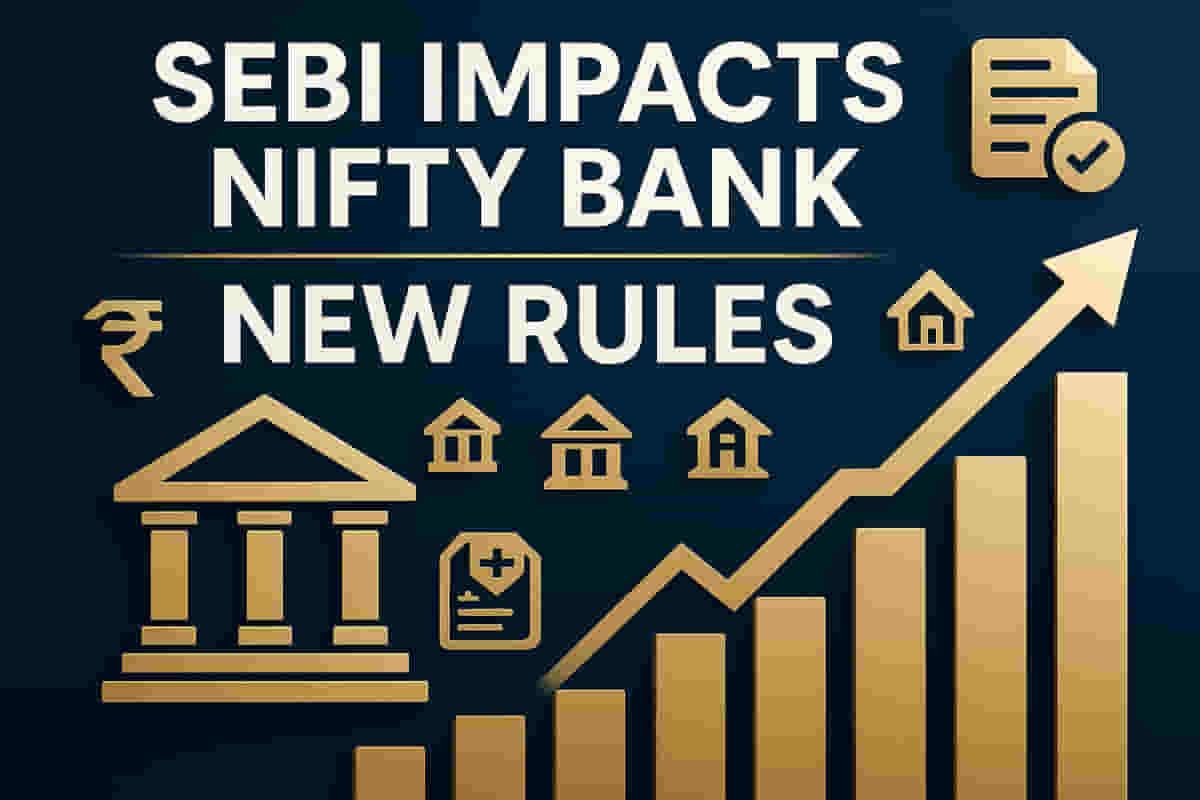SEBI Tightens Nifty Bank Index Rules, Capping Top Stocks and Expanding Membership
Banking/Finance
|
Updated on 31 Oct 2025, 04:59 am
Reviewed By
Aditi Singh | Whalesbook News Team
Short Description :

▶
Stocks Mentioned :
Detailed Coverage :
The Securities and Exchange Board of India (SEBI) has released a new circular aimed at enhancing the eligibility criteria for indices like the Nifty Bank, particularly for derivative trading. This move introduces staggered deadlines and provides some relief from previous directives.
A key change is the implementation of weight capping for index constituents. The weight of a single top constituent will be capped at 20%, a significant reduction from the current 33%. Furthermore, the combined weight of the top three constituents will be limited to 45%, down from the existing 62%. This means that dominant banks like HDFC Bank, ICICI Bank, and State Bank of India, which currently hold substantial weightage, will see their influence gradually decrease.
The circular also mandates that non-benchmark indices, such as the Nifty Bank, on which derivatives are traded, must comprise a minimum of 14 stocks. The Nifty Bank currently has 12 constituents.
As of September 30, HDFC Bank held a 28.49% weight in the Nifty Bank, followed by ICICI Bank at 24.38% and State Bank of India at 9.17%. Kotak Mahindra Bank and Axis Bank are also among the top five.
This rebalancing opens the door for potential new entrants into the Nifty Bank index, with stocks like Yes Bank, Indian Bank, Union Bank of India, and Bank of India being identified as candidates. The adjustments will occur in four phases, concluding by March 31, 2026, with the first phase starting in December 2025.
Nuvama Alternative & Quantitative Research estimates that the inclusion of Yes Bank and Indian Bank could attract inflows of approximately $104.7 million and $72.3 million, respectively. If all four mentioned banks are included, the expected inflows could reach $107.7 million for Yes Bank, $74.3 million for Indian Bank, $67.7 million for Union Bank of India, and $41.5 million for Bank of India.
Following this news, shares of Union Bank of India saw gains of 4.4%, while Yes Bank, Indian Bank, and Bank of India experienced gains between 1.5% and 2.5%.
Impact: This news will significantly impact the Nifty Bank index by reducing concentration risk and promoting broader participation from banking stocks. It is expected to lead to portfolio rebalancing by index funds and ETFs, potentially causing substantial inflows into mid-cap and small-cap banking stocks that are likely to be added to the index. The overall impact on the banking sector's stock performance could be positive for newly included banks and could moderate the growth of the largest banks within the index. The derivatives market linked to Nifty Bank will also need to adjust to the new composition and weightings. Impact Rating: 8/10
Difficult Terms: SEBI: Securities and Exchange Board of India, the regulatory body for securities and futures markets in India. Nifty Bank: A stock market index that represents the banking sector of the Indian economy, comprising the most liquid and capitalised Indian bank stocks listed on the National Stock Exchange (NSE). Derivative eligibility rules: Regulations that determine which financial instruments (like futures and options) can be traded based on an underlying asset or index. Weight capping: A regulatory measure to limit the maximum influence or proportion a single constituent can have within an index. Constituent: A company or stock that is part of a particular stock market index. Non-benchmark index: An index that is not a primary market index but is still used for trading financial products. Tranches: Installments or portions of a larger amount or payment, in this context, referring to phased implementation of the new rules. Inflows: Money invested into a particular asset, fund, or market.
More from Banking/Finance

Banking/Finance
SEBI is forcing a nifty bank shake-up: Are PNB and BoB the new ‘must-owns’?
Latest News

Auto
Suzuki and Honda aren’t sure India is ready for small EVs. Here’s why.

Brokerage Reports
Stocks to buy: Raja Venkatraman's top picks for 4 November

Mutual Funds
Quantum Mutual Fund stages a comeback with a new CEO and revamped strategies; eyes sustainable growth

Tech
Why Pine Labs’ head believes Ebitda is a better measure of the company’s value

Industrial Goods/Services
India’s Warren Buffett just made 2 rare moves: What he’s buying (and selling)

Startups/VC
a16z pauses its famed TxO Fund for underserved founders, lays off staff
Renewables Sector

Renewables
Brookfield lines up $12 bn for green energy in Andhra as it eyes $100 bn India expansion by 2030
Energy Sector

Energy
India's green power pipeline had become clogged. A mega clean-up is on cards.
Renewables Sector

Brookfield lines up $12 bn for green energy in Andhra as it eyes $100 bn India expansion by 2030
Energy Sector
